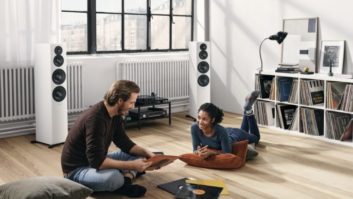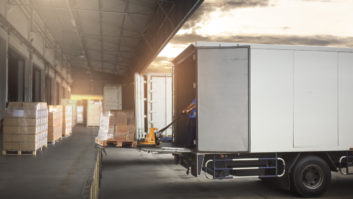TWICE:
If HDTV was the growth catalyst
of the 2000s, what will be the new industry
drivers for this decade?
Jim Ristow, executive VP, Home
Entertainment Source (HES):
The nontraditional
category mix, i.e., green, energy
management, whole-home control,
IP, IT — things that are not traditional
to our channels. It’s much wider than
what most people thought two years ago.
Explaining IPTV to a consumer and
presenting that experience, that demo,
and showing how it’s going to interact
in their home, it’s a whole different way
of looking at things. It’s more than just
the product itself. I think that’s going to
be our next biggest opportunity and also
our largest challenge — to make that a
simple solution for everyone.
TWICE:
Best Buy has been tapping into
some non-traditional categories, like musical
instruments and fitness.
Michael Vitelli, executive VP, consumer
operating group, Best Buy:
We
were pleased with those and how they
started to develop. You could also argue
that the e-reader business is a new category
for the consumer electronics industry
in the sense that it’s adding books to consumer
electronics, which is a positive.
I think you have two cycles: The next
three to fi ve years of getting people connected
to their devices is a growth period.
And in the three- to six-year period
it will be energy management/home control,
because our industry has looked at it
a lot by way of entertainment control.
Ristow:
That will also include homesecurity
control and surveillance.
Vitelli:
The channels that are at the
front edge of being in consumers’ homes
on a regular basis have an opportunity
there.
Dave Workman, executive director/
COO, PRO Group:
That’s why I always
sort of get frustrated when I hear people
say there’s nothing new. There isn’t necessarily
a home run, but there are a thousand
base hits out there on the fl oor. Not
all of them are relevant to every business
model, so the thing that every retailer
has to look at is how to integrate some of
these new categories.
The consumer is going to have some
want for this integration. You are talking
about a connected system, which
does more than just entertain you. It also
manages energy and maybe is energy efficient, and perhaps there are some other
things involved.
Retailers need to start thinking forward
to those businesses. Some of them
are the bleeding edge right now and
some are leading edge right now, but the
key is to start exploring these types of
things because they will be the relevant
technologies.
We’re also seeing a rapid escalation of
how quickly technologies are morphing,
and that is another challenge for a retailer.
E-readers were a hit product for this
season, but in my opinion are probably
going to very quickly morph from an application
or an enable technology into
some sort of a tablet device. Will e-readers
be a category, or will they be a feature
on another product? It’s one thing to get
on the horse, and it’s another to stay on
the horse.
Ross Rubin, industry analysis director,
The NPD Group:
E-readers are also interesting
because they’re an example of a retailer,
Amazon.com, capitalizing on a category.
But it also has the potential to show
how brick-and-mortar retailers can capitalize
on content devices with some of the
things Barnes & Noble is doing with the
Nook in terms of the Wi-Fi capabilities.
When you bring it into the store, you have
access to browse content there, and as we
see other kinds of devices get that connectivity, it opens up a lot of possibilities.
Dan Schwab, co-president, D&H Distributing:
There will be a lot of singles
this year, but then there’s the whole area
of connectivity. Once you have the device,
there’s a big opportunity in what
you want to be able to do with it, whether
it’s content or control.
There is still a home run to be had out
there, and this year it’s the mobile devices
themselves; that is what leads the pack.
There is still a tremendous potential audience
that does not have a smartphone,
and there are going to be mobile Internet
devices with the acronym MIDs. There’s
going to be a whole slew of products that
are variants upon each other.
Rubin:
It’s a continuum from the
smartphone to the laptop.
Schwab:
I really think this year is going
to be very exciting. There are going
to be a lot of different form factors. The
Flip was a singular function device, which
was a tremendous solution, but I think
Connected
continued from page 18
today these are going to be multi-use devices
that are going to completely open
up the consumer because the experience
to date has mostly been an iPhone. That
is the primary device, though BlackBerry
has now made large inroads. The masses
have not fully experienced the full capability
and the larger data stream, whether
you use it for an e-book or true Internet
browsing.
Those are the seeds that then
drive the back office, whether
it’s the home server or connectivity
to the different
apps. I really think that’s
the home run and the big
opportunity this year.
Rubin:
Also, over the
next two years you’re going to
see the infrastructure really mature
to where it can supply content to
these devices.
Workman:
In this business every
product at some point becomes a commodity,
but solutions generally don’t. If
you remember that about this business,
you don’t end up getting surprised. If
you think back to home theater, it wasn’t
a product, it was a solution. It took two
products that were long in the tooth in
their technology, and the industry combined
them to create a solution, which
created value and thus margin. It’s the
same with mobility. That is where there
is a lot of energy, and the good news is
the connected aspect of all these various
devices creates a solution. While there
may be individual price pressure on
one item, the solution will have
value in it and thus margins
for retailers so we can stay
in business.
Fred Towns, senior VP,
New Age Electronics :
Consumers want the convenience
of taking it with
them, and as Dan was saying,
a lot of different things will probably
be meshing into a portable device of
some sort. The other thing that is going
to change is that most of it is going to
start to turn to solid state vs. hard drive,
because consumers are going to expect
speed and they don’t want to wait any
longer for the boot-up time. That will
bring a whole new configuration. That
new world is changing very quickly, and
the platforms that support it are changing
and going all multimedia. Windows
7 was a really big change for Microsoft,
but they saw what Apple was doing and
it was a need.
TWICE:
Do you see traditional audio/video
specialists getting into wireless mobility?
Towns:
We’re seeing a trend in that a
lot of guys who typically were not on the
connection side using computing are now
saying, “I’ve got to be in that.” Everything
is converging together and connecting
into one. Some way, some how, I think
they’re missing a link if they’re not.
Jeanette Howe, executive director, Specialty Electronics Nationwide (SEN):
One of the things that I’m very enthused
about is smart-grid technology. GE just announced
a relationship with Tendril Networks,
and Whirlpool [attended] CES
showing product. In the Nationwide family
there are thousands of appliance dealers,
and those appliance dealers are going to be
selling smart-grid technology. And if you
just put a smart appliance on a floor and it’s
not hooked to the grid, it’s just a dumb appliance,
so installing it will also be a huge
opportunity for the specialty dealer.
There is also an enormous opportunity
in the green-technology arena for dealers
to get involved. To Dave’s point, there
is a lot of opportunity right now not just
in IPTV and connectivity, but in how
those devices will be controlled by your
cellphone. You’ll be able to look at
your phone and know what
kind of energy you’re utilizing
within your home, and
you’ll be able to control that
consumption. There is a lot
of convergence still happening,
and that’s an opportunity
for all of us.
TWICE:
David, is there a smartbook
in your future?
David Pidgeon, president/CEO, Starpower:
It’s a big thing for us because we
do a tremendous amount of custom installation,
and we have to be at the top of
our game. We have to understand all the
computing.
Where the real question comes in is
responsibility. The customer didn’t buy
the computer from you, but they’re using
you to do everything and something goes
wrong. Whose fault is it, and who is paying
for it? That’s where there is some confusion
because we are a full-service dealer
where they pick up the phone and call
us on anything they bought, and we take
care of it. They know it’s going to be taken
care of, but all of the sudden their network
goes down. Is it my fault? Is it the
computer’s? Is it consumer error? There
is a problem with being able to figure out
how you tell where the responsibility resides,
and right now it is just walking on
eggshells.
However, if you want to stay in this
industry and differentiate yourself, you
have to be able to work with all the different
new technologies and put them all
together. When the customer comes to
you and says “I need this,” and you say,
“Well, we can’t do that” — that is what
our industry is really going to struggle
with over the next few years.
Schwab:
That’s an interesting point
because the reliability of CE has been very consistent, and the reliability of IT
when you’re adding a lot of devices has
been very inconsistent from a compatibility
standpoint.
You could draw parallels from the IT
industry and the resources that sell to
businesses. They become the outsourced
IT departments. They have ongoing contracts
and service agreements so that if a
system goes down, they are going to be
there. It is their responsibility. In fact,
they diagnostically go in to make sure
drives are still available so you
can still download more movies.
It’s an ongoing revenue
stream, but it is also their
responsibility.
As you make the home
network more complicated,
it creates an opportunity
for someone to help manage
that. It probably necessitates
that because long term it’s not just your
TV and your DVD player. Now your
home-security system is tied into it and
your ability to access the Internet is tied
into it. If you’re having guests over and the
streaming is not working, that becomes a
potential long-term opportunity.
Towns:
One of the things the cellular
companies always wrestle with is if you
don’t get a good signal on your phone, is
it the phone or is it the carrier? As these
devices become more prevalent and connectivity
is more prevalent, teaching the
consumer what to look at to see if it is
working right or not becomes very important,
because nine out of 10 times it’s
typically not a hardware failure.
Rubin:
There’s a great lesson from Apple,
because with the iPhone, people definitely
blame the carrier.
TWICE:
Sounds like all of this plays into
Best Buy’s investment in Geek Squad.
Vitelli:
As I’m listening to this I’m very
happy that we have Geek Squad because
I think it’s true. When you’re connecting
all of these devices together, unfortunately
we’re actually increasing complexity
in the short term, and until the IT
world is like the landline phone and the
television, which may be a while, I think
there is an opportunity to be able to provide
whole house and whole out-of-house
responsibility. Having a lot of locations
and thousands of employees gives us an
opportunity to provide that.












